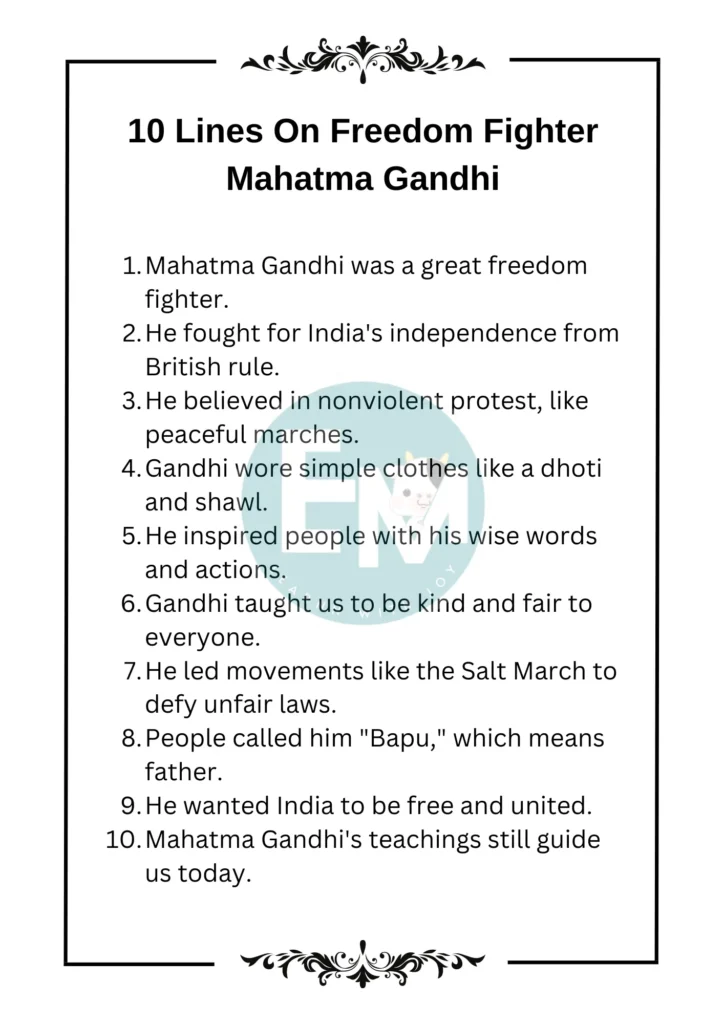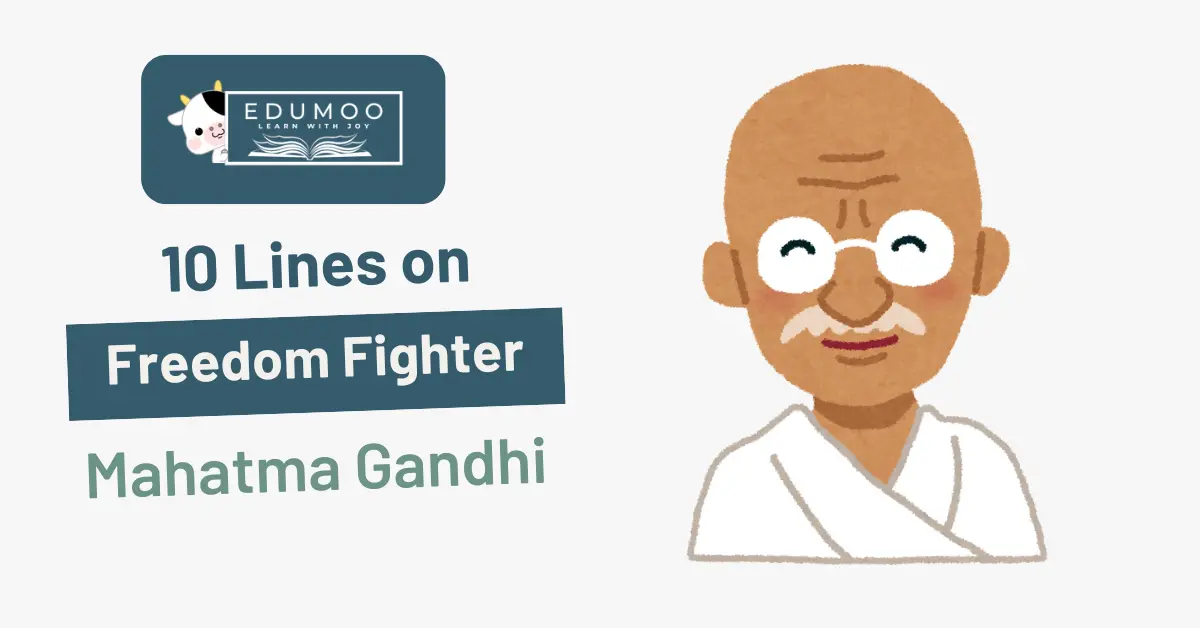Welcome to a journey through the life of Mahatma Gandhi, a remarkable man who changed the course of history with his powerful ideas and actions. Born in India in 1869, Gandhi grew up to become a leader of the Indian independence movement. His teachings of nonviolence and civil disobedience inspired millions to stand up against injustice. In this blog, we will explore his life, his struggles, and his enduring legacy that continues to inspire people around the world. Let’s check 10 lines on freedom fighter Mahatma Gandhi.
10 Lines On Freedom Fighter Mahatma Gandhi
- Mahatma Gandhi was a great freedom fighter.
- He fought for India’s independence from British rule.
- He believed in nonviolent protest, like peaceful marches.
- Gandhi wore simple clothes like a dhoti and shawl.
- He inspired people with his wise words and actions.
- Gandhi taught us to be kind and fair to everyone.
- He led movements like the Salt March to defy unfair laws.
- People called him “Bapu,” which means father.
- He wanted India to be free and united.
- Mahatma Gandhi’s teachings still guide us today.

Essay On Freedom Fighter Mahatma Gandhi In 500 Words
Mahatma Gandhi, the epitome of peace and the father of the Indian nation, stands tall in the annals of history as a beacon of hope and inspiration. Born on October 2, 1869, in Porbandar, India, Gandhi’s life was an extraordinary saga of unwavering determination, selflessness, and profound wisdom.
Throughout his journey, he advocated for nonviolent resistance and led India to independence from British rule. This essay delves into the life, philosophy, and remarkable contributions of this iconic freedom fighter.
Gandhi’s transformative journey began with his education in law in England, where he became acquainted with Western philosophy and ideologies. However, it was during his time in South Africa that he first encountered the blatant racial discrimination faced by Indians.
Gandhi was deeply troubled by the injustices he witnessed, prompting him to initiate his first acts of civil disobedience. He coined the term “Satyagraha,” meaning the insistence on truth, to describe his philosophy of nonviolent resistance, which would later become the cornerstone of India’s freedom struggle.
Returning to India in 1915, Gandhi plunged himself into the country’s freedom movement, leading countless campaigns against British colonial rule. He advocated for Swaraj, or self-rule, emphasizing the empowerment of ordinary citizens to challenge oppression through peaceful means.
One of his most iconic movements was the Salt March in 1930, where he led thousands on a 240-mile journey to produce salt from the sea, defying the British monopoly on salt production and sparking a nationwide wave of civil disobedience.
Gandhi’s methods of nonviolent resistance were not merely tactical; they were deeply rooted in his spiritual beliefs and moral convictions. He believed in the inherent goodness of humanity and the power of love to overcome hatred and violence.
His principles of ahimsa (nonviolence) and satyagraha (truth force) inspired millions to join the struggle for freedom, transcending barriers of caste, creed, and religion.
Despite facing numerous challenges and enduring multiple imprisonments, Gandhi remained steadfast in his commitment to nonviolence and truth. His unwavering resolve and moral authority earned him the reverence of not only Indians but also people across the globe. Leaders like Martin Luther King Jr., Nelson Mandela, and Cesar Chavez drew inspiration from Gandhi’s teachings in their own fights against oppression and injustice.
Moreover, Gandhi’s vision extended beyond political freedom; he envisioned a society based on principles of equality, justice, and compassion.
He worked tirelessly to eradicate social evils such as untouchability and gender discrimination, advocating for the upliftment of the marginalized and oppressed. His emphasis on self-reliance and sustainable living laid the foundation for India’s socio-economic development and the promotion of rural industries.
Gandhi’s legacy, however, transcends the boundaries of time and geography. His message of peace, tolerance, and harmony remains as relevant today as it was during the tumultuous days of India’s freedom struggle.
In a world plagued by conflicts and divisions, Gandhi’s teachings offer a ray of hope and a pathway to reconciliation and understanding.
In conclusion, Mahatma Gandhi’s life and legacy serve as a testament to the power of nonviolence and moral courage in the face of adversity. His relentless pursuit of truth and justice continues to inspire generations to strive for a world free from oppression and injustice.
As we commemorate his legacy, let us not only remember his extraordinary deeds but also imbibe the timeless values of compassion, empathy, and tolerance that he embodied. Truly, Mahatma Gandhi remains an immortal symbol of peace and humanity in a world yearning for both.
| Also Read: 10 Lines On Myself In English |
Essay On Freedom Fighter Mahatma Gandhi In 750 Words
Mahatma Gandhi, revered as the father of the Indian nation, was not just a man but an ideology in himself. Born on October 2, 1869, in Porbandar, India, Gandhi’s life journey encapsulates the essence of nonviolent resistance and unwavering commitment to freedom.
Throughout his life, he advocated for the rights of the oppressed, leading India towards independence from British colonial rule. This essay delves into Gandhi’s profound impact on India’s freedom struggle and his enduring legacy as a symbol of peace and justice.
Gandhi’s early life was marked by simplicity and moral values. His upbringing in a devout Hindu family instilled in him the principles of truth, nonviolence, and service to humanity.
As a young boy, he showed an affinity for truthfulness and ethical living, traits that would define his later endeavors. Gandhi’s education in law took him to London, where he was exposed to Western ideologies and social injustices, laying the foundation for his future activism.
It was in South Africa that Gandhi’s transformation into a crusader for justice began. Experiencing firsthand the discrimination faced by Indians under apartheid policies,
Gandhi resolved to fight against racial inequality. His philosophy of satyagraha, or nonviolent resistance, emerged during his time in South Africa. Through peaceful protests, boycotts, and civil disobedience, he challenged discriminatory laws, ultimately securing significant concessions for Indian immigrants.
Upon returning to India in 1915, Gandhi brought with him the principles of satyagraha, which would become the cornerstone of India’s freedom movement. Satyagraha emphasized the power of truth and nonviolence in confronting injustice, offering a potent alternative to armed rebellion.
Gandhi believed that by appealing to the conscience of oppressors, genuine change could be achieved without resorting to violence. His first major campaign in India was against the unjust taxes imposed on farmers in Champaran, Bihar, where his peaceful protests garnered widespread support and laid the groundwork for future movements.
One of the most iconic moments in India’s struggle for independence was the Salt March of 1930. In defiance of British salt laws, which imposed heavy taxes on salt production and sales, Gandhi led a 240-mile march to the coastal town of Dandi, where he symbolically made salt from seawater.
The Salt March galvanized millions of Indians in a mass movement of civil disobedience, shaking the foundations of British colonial rule. Gandhi’s call for peaceful resistance struck a chord with people across India, inspiring them to join the fight for freedom.
As World War II raged on, Gandhi intensified his efforts to secure India’s independence. In 1942, he launched the Quit India Movement, demanding an end to British rule in India.
Despite facing severe repression from the colonial authorities, including arrests and violence, the movement gained momentum, signaling the beginning of the end for British imperialism in India. Gandhi’s unwavering resolve and commitment to nonviolence inspired millions to rise up against oppression, hastening the path to independence.
Mahatma Gandhi’s legacy extends far beyond India’s struggle for independence. His principles of truth, nonviolence, and moral integrity continue to resonate with people around the world, inspiring movements for civil rights, social justice, and peace.
Gandhi’s message of love and compassion remains as relevant today as it was during his lifetime, offering a timeless blueprint for building a more just and equitable society. His teachings have influenced countless leaders and activists, from Martin Luther King Jr. to Nelson Mandela, who have drawn inspiration from his example in their own quests for freedom and equality.
Mahatma Gandhi’s life exemplifies the power of one individual to ignite change and transform the course of history. Through his unwavering commitment to truth and nonviolence, he led India to independence and inspired countless others to embrace the values of peace, justice, and human dignity.
Gandhi’s legacy serves as a guiding light for humanity, reminding us that even in the face of adversity, the path of righteousness and compassion ultimately leads to triumph. As we commemorate his life and teachings, let us reaffirm our commitment to building a world where freedom, equality, and fraternity reign supreme.
Conclusion
In conclusion, Mahatma Gandhi’s life serves as a beacon of hope and inspiration for generations to come. His unwavering commitment to truth, nonviolence, and justice continues to resonate in the hearts of people worldwide.
By following his teachings of peace and equality, we can strive to create a better world for ourselves and future generations.
Gandhi’s legacy reminds us that even the smallest acts of kindness and courage can ignite powerful change in the world. I hope you learn and understand 10 lines on Freedom Fighter Mahatma Gandhi and an essay on Freedom Fighter Mahatma Gandhi.

